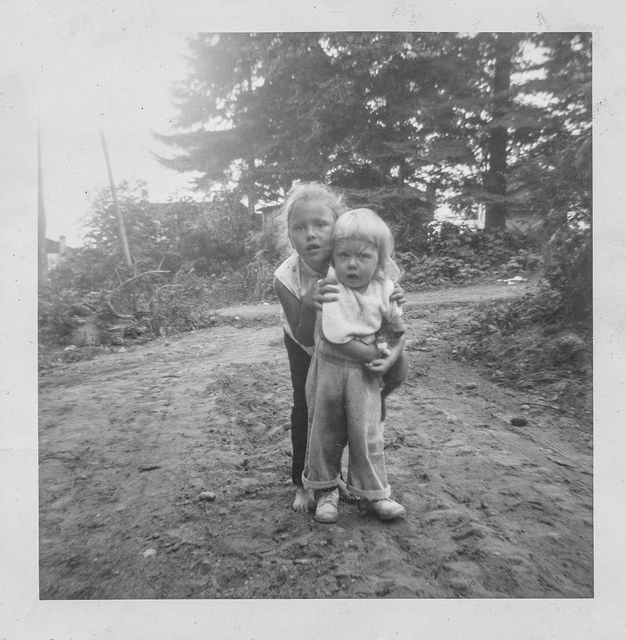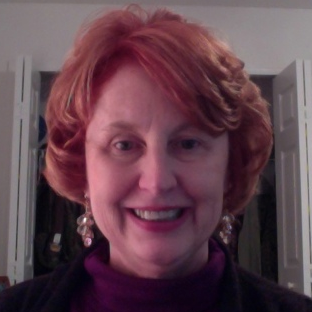Essay by Carol M. Folsom
Making up Lost Memories—and Conjuring the Truth

I’m six years old, playing with my little sister in the pine trees, sandspurs, and dandelions of our rural Georgia front yard, a flat spot at the top of a red clay bluff. It’s summer, almost suppertime. Mama’s inside, baking a pound cake. We’re waiting for Daddy to come home from his job at the Coca-Cola Company. Finally, his black Ford pickup crunches up our gravel driveway. He parks, gets out, walks toward us, cigarette dangling from his mouth. But halfway across the yard, he staggers and falls, calling out to my sister, “Run inside and get your mama.” I, the older sister, the one who rides the school bus all by herself, can only stare.
Ten years ago, I wrote a scene for a novel in which a father parked a black truck in the driveway, walked across his yard, and collapsed with a heart attack before reaching the house. Two years ago, during a road trip with my younger sister, she told me about our father’s heart attack in 1956. It happened in the yard of our home after he’d parked in the driveway. I had no conscious memory of his heart attack. Awed, I listened to my sister describe the real event just as I’d described the fictional heart attack in my story—a story she'd never read.
It's not the first time I've “made up” a lost memory. While on maternity leave from my job as a lawyer 25 years ago, I drafted a story set in a small town in Georgia. I described the Feed and Seed, the Rexall drugstore, raised sidewalks with handrails, a set of double railroad tracks down the center street, and a one-room train depot. Five years later, my aunt died, and I headed to Georgia for the funeral. Near Eastman, I turned off the state road to look for a florist. When I reached the main street, I was amazed to see the town I’d imagined. I hadn’t made it up at all; I’d remembered it from shopping excursions in the early ‘50s with my long-deceased grandparents.
I suppose that I suppressed the memory of my dad’s heart attack to protect the terrified six-year-old me. But recovering that memory lets me view it through the eyes of an adult, eyes that know my father survived to raise and love the two little girls who had watched him fall. Maybe I’ve reached the age where I don’t fear the monster under the bed anymore, or maybe my fascination with the subconscious trumps it, but when I’m at the keyboard now, I’m willing to open the door to whatever knocks. If I can write about painful things, I can bear them.
Excavating and sharing secrets with others, be it through fiction or nonfiction, is what writers do. This helps both writer and reader grasp the most powerful human secret of all: We are not alone in our suffering, no matter how shocking or unusual our particular circumstances. This one bite of knowledge, chewed up and swallowed, lifts a burden Atlas himself could not have budged.
I'm an attorney by profession, but I do volunteer work for the National Alliance on Mental Illness, helping teach its “Family-to-Family” course, a twelve-week class for relatives and friends of people struggling with mental illness. When family members first come to the class, many are so shamed by the stigma of mental illness they can hardly speak about their own experiences.
But as weeks go by and trust within the group grows, class members tell their stories: the son with a full engineering scholarship who now thinks his TV is bugged by the Nazis; the prom queen daughter who’s tried to kill herself three times; the bipolar young mom who self-medicates with street drugs while her husband copes with three small kids at home. By the end of the course, these members realize through shared storytelling that they have plenty of company on their difficult journeys. Every time, the relief in their faces thrills me anew.
Faith is required, not only in the writing process, but also in what you write about. Long before angels starred in Hallmark specials and tacky rows of them peopled Big Lots shelves, I attended a talk by a local artist who specialized in painting angels. She showed slides of her work, each painting a stunning depiction of heaven meets earth. I’ve always treasured her comment then: “The angels come out better if I step out of the room and let God paint them.”
Truth is, it’s impossible to know where words will land or when or who might be touched, possibly even saved, by reading them. And this applies to words the writer knows are not nearly good enough, which is pretty much always the case with writers, especially this one.
Two years ago, I arrived home at midnight after a flight, exhausted and irritable as only a middle-seat passenger can be. As I hoisted my suitcase from the trunk of my aged Honda, a bird trilled close by. I spotted the mockingbird at the top of our crab apple tree, just a few feet from where I stood. It was as if it sang to me; I was its only audience at that late hour. For a moment, I forgot my fatigue and everything that troubled me. I listened, enchanted, glad to be part of a world where beauty exists for its own sake—to think the mockingbird sings just because it’s made that way.
Art Information
- "Two Terrified Little Girls on the Road" © simpleinsomnia; Creative Commons license.
 Carol M. Folsom is a retired lawyer in Jacksonville, Florida. Her writing has appeared in Cradle Songs, Three Minus One, Flashlight Memories, Whirlwind Review, and Everyday Fiction. She has just completed her first novel.
Carol M. Folsom is a retired lawyer in Jacksonville, Florida. Her writing has appeared in Cradle Songs, Three Minus One, Flashlight Memories, Whirlwind Review, and Everyday Fiction. She has just completed her first novel.
